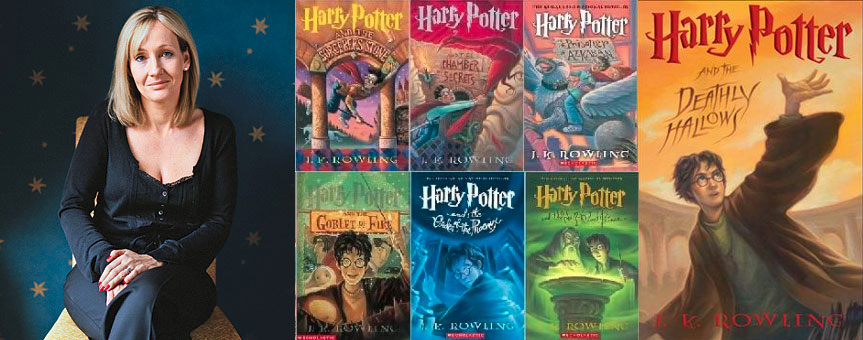Regardless of whether you have personally read a single page of the Harry Potter novels, there’s no mistaking the immense impact those books have had on readers around the world. In their annual quest to name a “Person of the Year”, Time Magazine listed J.K. Rowling – author of the seven Harry Potter novels – as a “Runner Up”.
Why is she a Runner-Up this year? Because the seventh book was published this summer, completing the series and marking the end of a literary era.
Time published an excellent article on their website that I would call a “must-read” for anyone who is a fan of the series … is serious about literary criticism … has young children of reading age … or is critical of the Harry Potter books. In other words, I think this article is a great read for everyone.
JK Rowling – Person of the Year 2007 – Runner-Up
Some of the highlights from the article:
It’s not just Harry’s secrets that can now be revealed. It is hers as well. The biggest mystery, appropriately, had to do with Rowling’s own soul. As soon as her tales achieved fame, they were denounced by fundamentalist clerics from the U.S. to Russia to the Muslim world. The Pope warned about their “subtle seductions” that might “distort Christianity in the soul.” One day when Rowling was shopping for toys in New York City, a man recognized her. Her voice gets hard as she recalls how he brought his face very close to hers. “He says, ‘I’m praying for you,’ in tones that were more appropriate to saying, ‘Burn in hell,’” she says, “and I didn’t like that ’cause I was with my kids. It was unnerving. If ever I expected to come face to face with an angry Christian fundamentalist, it wasn’t in FAO Schwarz.”

Through it all, Rowling didn’t really fight back. Talk too much about her faith, she feared, and it would become clear who would live and who would die and who might actually do both. After six books with no mention of God or Scripture, in the last book Harry discovers on his parents’ graves a Bible verse that, Rowling says, is the theme for the entire series. It’s a passage from I Corinthians in which Paul discusses Jesus’ Resurrection: “The last enemy that shall be destroyed is death.”
Back in July, when I snatched my copy of Book 7 off the shelf of that Arkansas Walmart, I was in such a hurry to get through to the end and find out what happened that I read quickly. I had every intention of going straight back to the beginning and reading it through a second time, at a much more leisurely pace, so I could savor the writing, and the characters, and the details. Because, you see, this is a detail that completely passed by me in my haste to get to the end – I recognized the Christ-like symbolism (how could you not?) of Harry sacrificing himself to protect everyone else, that ultimate evil in Voldemort could only be overcome by the self-sacrifice of love … but the specific Bible verse? Completely missed it.
And yeah, that’s a big, huge deal given the immense criticism the Potter series has come under from fundamentalist Christians who take issue with the fact that, despite such clear lessons of right and wrong, story lines that dealt with corruption of power, bigotry and enslavement and issues of ethics – there was no mention of God in Rowling’s books.
The values in the books, she observes, are by no means exclusively Christian, and she is wary of appearing to promote one faith over another rather than inviting people to explore and struggle with the hard questions … Rowling’s religious agenda is very clear: she does not have one. “I did not set out to convert anyone to Christianity. I wasn’t trying to do what C.S. Lewis did. It is perfectly possible to live a very moral life without a belief in God, and I think it’s perfectly possible to live a life peppered with ill-doing and believe in God.” And now she climbs into a pulpit of her own, and you can tell how much this all matters to her, if it weren’t already clear from her 4,100-page treatise on tolerance. “I’m opposed to fundamentalism in any form,” she says. “And that includes in my own religion.”
Amen, sister. I get the feeling J.K. Rowling is the kind of woman I’d love to sit down with for a cup of tea.
To those who still criticize these books, I point to the truth in this excerpt from the article:
James Thomas, a professor of English at Pepperdine University … argues that the books do more than entertain. “They’ve made millions of kids smarter, more sensitive, certainly more literate and probably more ethical and aware of hypocrisy and lust for power. They’ve made children better adults, I think. I don’t know of any books that have worked that kind of magic on so many millions of readers in so short a time in the history of publications.”
In a day and age when children are allowed to rot their brains on websites, television shows, and movies with no redeeming nutritional mental value – and yes, I’m talking about children from those homes who parents are so heatedly declaring Rowling’s series as “dangerous” – perhaps they should sit down, read the books themselves, and make up their own minds, rather than letting closed-minded idiots like Richard Abanes do it for them.
I’m thinking that smarter, more sensitive, more literate, more ethical children are a good thing. Of course, making them aware of hypocrisy and lust for power … that might be just what they’re afraid of.
I’m pulling “Harry Potter and The Deathly Hallows” back off my bookshelf and putting it in the stack of “to be read” … in fact, I think it’s going to the top of the stack. It might just get started again tonight. J.K. Rowling is an amazing woman, showing what can be done with hard work, determination, and the power of creativity. This single mother who was on welfare is now the second wealthiest woman in the world – next to Oprah – and the first person to ever become a billionaire by writing books. She herself is active in charity work, and her words have inspired others to make a difference in the world around them.
You go, girl.


 »
»
Leave a Reply